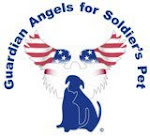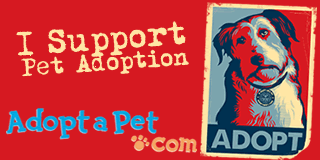Hello, I'm Professor Dexter. I used to be a professor in bug chemistry, but now I'm a professor in canine communication. Because my person rescues dogs, I was exposed at a very early age to all sorts of personality types – in dogs that is. At well over 3 years of age, I am now a canine counselor.
I have seen many, many troubled dogs come to us that later did very well because my sister and I taught them better canine communication skills. I have found that many dog problems stem from an inability to communicate with each other the right way. Sometimes we simply misunderstand each others’ body signals (which is mostly what we go by). When this happens, everyone gets upset, really for no reason at all. Then, when the humans step in and they don't understand what's going on, it can get even worse. Sometimes humans think dogs are so much like themselves!
Dogs really are professors of sorts. They learn, then teach, learn, then teach. They teach for the purpose of survival and that survival is for all involved, not just for one. I learned from my older sister Hailey, with her gray muzzle, because she had to teach other rescue dogs lessons and learned from those lessons herself. Now I'm teaching my little sister, Posie, proper dog-to-dog skills. She's still in the "positive experience only allowed" mode because, at a year and a half, she's still young. She has to build up her skills and have a fair amount of confidence to do a job like mine and work with the tough guys. My person says that we've all taught her about us.
I like being a professor/counselor. I like helping dogs that are insecure. They're usually the really loud, barking, growling, lunging dogs that make a big dramatic display. They are also the type most often misunderstood by the humans. Humans usually think these dogs want to fight and are aggressive. But usually they're just trying to AVOID a fight. Funny, huh? I just completely ignore the noisy, dramatic show. Showing them the side of my face makes it clear that I don't care if they're loud and trying to get me to go away. I'm not afraid of them because it's all just BS anyway, and after they're done with that business, I reward them with play for stopping that behavior. This also shows them the proper way to greet, instead of using gaudy distancing type behaviors that only drive away potential friends.
Read more after the break:
I have helped shy dogs because I'm not pushy and I don't HAVE to play with anyone, because I myself am very secure in how I feel. I let them come to me and I give them their space, and use special signals to show I'm not threatening. I have a very well formed and structured pack, so I'm cool. Our people are careful to make sure we are guided correctly too. But some dogs don't have that, because the humans that took care of them in the past didn't understand that early play, socialization and guidance are like food to a young dog. Without these things, it's like there's a malnourishment of the canine spirit. Some horrible people go a step further and actually do the opposite, and get their dogs to communicate the wrong way on purpose so fights start. Then, of course, one can't help it, you're stuck and sort of forced now to defend yoursel. It’s sad when that happens to dogs because it goes against our grain. When those guys come to us, I see right away that they never wanted to be in a fight at all. Most of them are so happy to see that, at our place, we do fun stuff where everyone wins.
The dogs begin to realize that there's a lot of confidence to be gained from other dogs, especially in a pack sense, and they really start to feel better. I see tails rise out of butts, heads come up even with or above the shoulders, and sometimes maybe even for the first time in their life, a smile.
Now I see Leo doing it. A dog my person took into rescue recently got really noisy while on his leash around Leo. Leo used to live with Michael Vick, so you can imagine that when he first came to us, he was initially a little sensitive around this sort of behavior....poor guy. Anyway, this new dog was barking and lunging at Leo while Leo was on his leash. Lo and behold, there was Leo, looking just like me, calm, still and turning his head so the insecure dog could see the side of his face. He told the dog, "I know how you feel but you're wrong, I'm just here, doing nothing, so it's ok and all will be well....when you're calm we'll meet." I was so proud of Leo. And the new dog will learn too. See how it works? We've worked with many dogs that are now helping other dogs.
My person says to please pardon the anthropomorphism (making dogs sound like people) but sometimes we have to explain things to dogs in dog language, like what I do for a living. Other times we have to explain things to humans in human language, like what my person does for a living.
Thanks for listening to my story. I may be starting a column somewhere called "Dexter's Corner" or "Dear Dexter," so that I can answer your questions and concerns about canine behavior. I hope you’ll find it useful.
Dr. Dexter
Expert in Dog Behavior Challenges
Shelter Volunteer
Well Loved Family Member
xoxo















